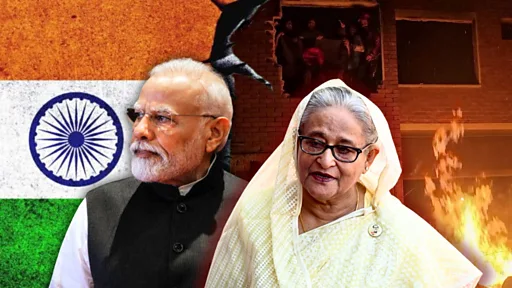Indian government has banned Sheikh Hasina from making anti-Bangladesh statements


Published: 02:55 9 October 2025
The Indian government is preventing Sheikh Hasina from making political statements like before, South Asia expert Radha Dutta has claimed. She said that the current re-examination of India's relations with Bangladesh indicates a slight departure from its previous position. Radha Dutta's comments indicate that the Indian government is concerned about Sheikh Hasina's political activities since she took refuge and has been trying to restrict her from making direct political statements.
The report says that since taking refuge in India, former Prime Minister Sheikh Hasina has been speaking quite openly about her position on the blockade and the coup; however, some analysts and political figures see these activities as an attempt to destabilize the situation. In this regard, Dr. Yunus and some local politicians have also expressed concerns. Despite repeated requests from Bangladesh to prevent the accused (who was accused of crimes against humanity in July) from speaking, no clear and visible steps have been taken so far, it has been mentioned.
However, Sheikh Hasina's presence on various social media platforms has decreased in recent times; and Radha Dutta sees this as a message from India - that is, the Indian government has indicated that it will not support the person in Dhaka or abroad for making provocative statements against Bangladesh. She added that to quell India's concerns, Bangladesh must ensure that any activities here do not pose a threat to India's security.
Expressing her opinion on the diplomatic and political implications of the incident, former ambassador Abdul Hai said that India's move indicates a departure from its previous position. He also said that the decision to return Sheikh Hasina to Bangladesh will ultimately depend on India's relations with the government that is elected in the future - that is, such issues will be resolved on the basis of the pace of relations between the two countries and diplomatic ease.
There is an expectation that there will be possible communication and discussion between the parties concerned at the state and diplomatic levels; at the same time, political analysts believe that such an incident is not only legal in terms of coups, asylum and international standards—it also carries diplomatic sensitivity. Therefore, effective coordination of the diplomatic channels controlled by Bangladesh and India and security assurances from both sides will be required to handle the issue.
Overall, Radha Dutta's claims and the comments of experts indicate that new controls may be imposed on hardline political activities and diaspora political interpretations here due to the impact of changes in neighboring India's perspective and policy; and the impact of such diplomatic signals will play an important role in future bilateral relations and considerations related to the coup.
Most Readed - Politics
- JB's law department student Mehnaz not included in BJS gazette
- Farewell ceremony of 5th grade students of The Child Learning Homes held in Durgapur
- 56 BGB seizes four ownerless Indian cows at Boda border
- BGB seizes huge quantity of Indian liquor in night operation
- Miscreants attack on rice sheaf banner in Narail - Concern in Hindu-dominated areas
- Fraud in the name of unregistered cooperative in Narail - Allegations against Astha Sangstha
- Gazipur teenager Selim suffers from terminal cancer, desperate plea for help
- EB Chhatra Dal's prayer mahfil for the health of Khaleda Zia
- EB Reform Movement's sit-in program on two demands
- Savar Disabled Woman Hanufa Murder Case: Property Misappropriation Was the Main Motive, Newly Revealed
- The Iranian public has mixed reactions to the death of President Ibrahim Raisi
- Iran's President Ebrahim Raisi and Foreign Minister died in the helicopter crash
- Ibrahim Raisi Killed: Mere Accident or Premeditated Murder?
- in the memory of Ibrahim Raisi, mourning in the country
- 3 KNF members were killed in a joint operation led by the army in Bandarban
- Today is Sheikh Hasina's 44th Homecoming Day
- Urinary Bladder Cancer: Symptoms to watch out for
- Kangana will say goodbye to the world of cinema forever
- High blood pressure 'silent killer' for kidneys
- France supports arrest warrant application against Netanyahu-Hania





